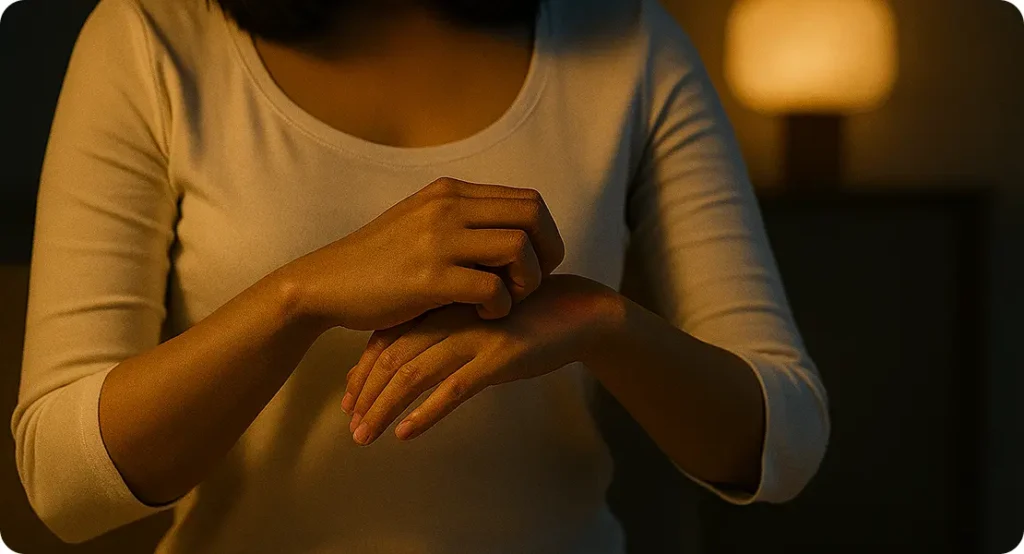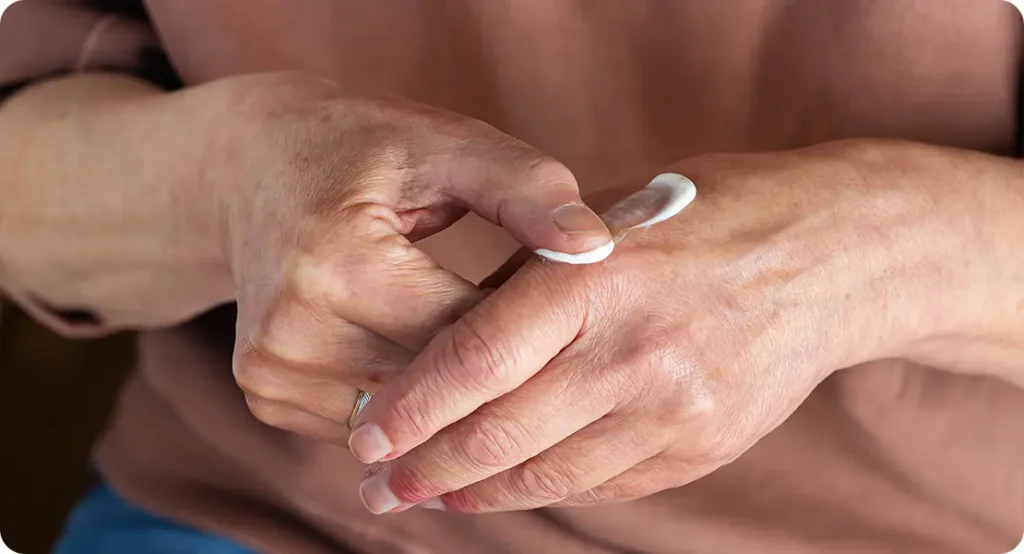There’s nothing more frustrating than finally crawling into bed after a long day, looking forward to some much-needed rest only to be kept awake by relentless itching. If you’re nodding along, trust me, you’re not alone. Night-time itching medically known as nocturnal pruritus can be a surprisingly common and deeply disruptive issue. It doesn’t just irritate your skin; it disrupts your sleep, affects your mood, and starts to chip away at your quality of life.
You might find yourself tossing and turning, scratching without even realising it, and waking up feeling just as exhausted as when you went to bed. And while the itching might ease up during the day, the evenings bring it back with a vengeance every night, like clockwork.
But here’s the reassuring part: you’re not imagining it, and more importantly, you don’t have to put up with it. There are real, diagnosable reasons why your skin may itch more at night and once you get to the bottom of it, there are effective treatments that can help you take control.
In this article, we’ll explore the most common causes of night-time itching from simple dry skin and eczema to more complex medical conditions. We’ll also look at why itching tends to get worse at night, how dermatologists diagnose the underlying problem, and most importantly, what you can do to finally soothe your skin and get a restful night’s sleep.
Because let’s face it good sleep is essential, and your skin deserves to feel calm, not constantly irritated. Whether you’re dealing with mild irritation or something more persistent, this guide will help you understand what’s going on and what steps to take next.
What Makes Skin Itch More at Night?
If you’ve ever wondered why your skin seems perfectly fine all day, only to start itching the moment your head hits the pillow you’re not imagining it. Night-time itching is a real and recognised phenomenon, and it affects more people than you might think. In fact, for many skin conditions, symptoms tend to flare up specifically in the evening or overnight, often disrupting sleep and increasing stress.
But why exactly does this happen? There are a few key reasons rooted in how the body functions during rest. Let’s break them down:
1. Natural Body Rhythms
Our bodies run on a 24-hour internal clock known as the circadian rhythm, which influences everything from hormone production to temperature regulation. And yes it even affects how our skin behaves.
In the evening and overnight, two important physiological changes occur:
- Body temperature increases slightly: This mild rise in temperature can cause the skin to feel warmer, which may enhance sensations like itching or burning especially if your skin is already inflamed or irritated.
- Cortisol levels drop: Cortisol is a natural anti-inflammatory hormone produced by your adrenal glands. It helps to keep itchiness, inflammation, and allergic reactions under control. But at night, cortisol levels naturally decrease, which means your skin is more vulnerable to inflammation and irritation during sleep hours.
This shift in body chemistry can cause any underlying skin issue such as dry skin, eczema, or allergies to feel more intense at night, even if it was relatively mild during the day.
2. Heightened Awareness
Another major factor is psychological and sensory awareness. During the day, we’re constantly distracted by work, conversations, screens, errands, and background noise. These distractions help shift our attention away from minor discomforts or sensations.
But when you lie down at night, especially in a dark, quiet room with no mental stimulation, your brain becomes more tuned in to subtle physical sensations. That tiny itch you might have ignored during the day suddenly feels magnified. And unfortunately, the more you focus on it, the worse it can feel creating a frustrating feedback loop that makes it harder to fall asleep or stay asleep.
This is especially common in people with chronic skin conditions, such as eczema, psoriasis, or hives, where even mild itching can escalate once the mind zeroes in on it.
Common Causes of Night-time Itching

Night-time itching can have a wide range of causes, from simple environmental triggers to chronic skin conditions and even underlying health issues. While sometimes it’s just a case of dry skin acting up in the cold weather, other times, persistent itching may be your body’s way of signalling something deeper.
Below are the most common culprits behind night-time pruritus and what sets them apart:
1. Dry Skin (Xerosis)
This is perhaps the most common cause of night-time itching, especially during the winter months. When your skin is dry, it becomes less resilient and more prone to irritation, tightness, and itching.
Several lifestyle and environmental factors can contribute to dryness:
- Cold weather and low humidity levels
- Central heating or air conditioning, which dehydrates the skin
- Long, hot showers or baths, which strip the skin of its natural oils
- Harsh soaps and cleansers that disrupt the skin’s barrier
At night, the skin’s natural ability to retain moisture is further reduced, especially when indoor air is dry. As a result, even people without any chronic skin conditions can experience tightness, flaking, and itching during the evening hours.
2. Eczema (Atopic Dermatitis)
Eczema is a chronic inflammatory skin condition that often begins in childhood but can affect people at any age. It’s characterised by red, itchy, dry patches that can appear anywhere on the body but most commonly on the hands, inner elbows, neck, or behind the knees.
What makes eczema particularly troublesome is that symptoms tend to flare at night, making restful sleep difficult. This is due to both the body’s reduced nighttime cortisol levels and the increased awareness of discomfort in a quiet, distraction-free environment.
Triggers for eczema flare-ups vary from person to person and may include:
- Environmental allergens like dust mites or pet dander
- Stress and anxiety
- Excess heat or sweating
- Irritating fabrics or personal care products
Because eczema is an immune-driven condition, managing it often requires a combination of moisturisers, anti-inflammatory creams, and sometimes oral medications prescribed by a dermatologist.
3. Chronic Urticaria (Hives)
Hives, also known as urticaria, are raised, itchy welts that can appear suddenly and last from a few minutes to several hours. In chronic urticaria, these welts occur frequently often daily for more than six weeks. And for many people, symptoms intensify in the evening.
The cause is not always obvious. Some people experience hives due to:
- Allergic reactions (to food, medication, or environmental allergens)
- Temperature changes or pressure on the skin
- Stress, fatigue, or even exercise
The itching from hives can be intense and disruptive. Although the welts themselves may come and go quickly, the underlying inflammation may persist for weeks or months making consistent treatment and trigger avoidance key.
4. Scabies
If your night-time itching is intense, especially in areas like the wrists, between the fingers, or around the waistline, scabies could be to blame. Caused by tiny mites that burrow into the upper layer of the skin, scabies is extremely itchy and the itch tends to worsen dramatically at night.
Common signs include:
- Small red bumps, often in a linear or zigzag pattern
- Intense itching, particularly at night or after a hot shower
- Itchiness spreading to close contacts or family members
Scabies is highly contagious and requires prescription treatment, usually in the form of a topical cream (like permethrin) and sometimes oral medication. If you suspect scabies, it’s important to see a dermatologist promptly not just to confirm the diagnosis, but also to prevent spreading it to others.
5. Liver or Kidney Conditions
While less common, persistent, unexplained itching especially if it’s widespread and not linked to a visible rash can sometimes be a sign of an internal medical issue. It’s your body’s way of telling you something is off.
In particular:
- Liver disease, including conditions like hepatitis or cirrhosis, can cause a build-up of bile salts under the skin, leading to generalised itching, often worse at night and not relieved by scratching.
- Kidney disease, particularly in advanced stages, can also cause pruritus due to the accumulation of waste products in the bloodstream.
These types of itching are often non-localised (meaning they affect large areas of the body), and they don’t always respond well to traditional topical treatments. If you’re experiencing this kind of chronic itch especially if accompanied by fatigue, yellowing of the skin or eyes, or other symptoms it’s important to seek medical attention to rule out an internal cause.
How Dermatologists Diagnose the Cause

Diagnosing itchy skin isn’t always straightforward or simple, as many different conditions can produce similar symptoms. However, dermatologists follow a detailed and methodical approach to get to the root of the problem. They’ll begin by taking a thorough medical history, asking key questions such as when the itching first started, whether it tends to get worse at certain times like during the night and whether there are any other symptoms present, such as redness, swelling, pain, or flaking.
Next, they’ll conduct a careful visual and physical examination of your skin to check for any visible signs of issues like excessive dryness, eczema, insect bites, contact dermatitis, or other rashes. If necessary, they may go further and carry out diagnostic tests. For example, they might perform a skin scraping to examine under a microscope for scabies mites or fungal infections. In more complex cases, blood tests could be recommended to investigate potential underlying conditions such as liver disease, kidney problems, thyroid imbalances, or iron deficiency. If an allergic reaction is suspected, patch testing may also be used to identify specific allergens that could be triggering the itch.
Simple Ways to Soothe Night-time Itching
You don’t necessarily have to wait for a full diagnosis before finding some relief. While identifying the root cause is important for long-term treatment, there are several easy, practical steps you can take right away to help calm the itch and improve your comfort at night:
- Moisturise Generously
Hydrating your skin properly can make a significant difference. After bathing, while your skin is still slightly damp, apply a generous layer of a thick, fragrance-free moisturiser. This helps lock in moisture and supports your skin barrier. Reapply before bed to keep your skin nourished overnight. Choose products containing skin-soothing ingredients such as ceramides (which help restore the skin barrier), hyaluronic acid (which draws moisture into the skin), or shea butter (which offers rich hydration and calming properties). - Take Lukewarm Showers
Although hot showers may feel relaxing, they actually strip the skin of its natural oils, which can worsen dryness and itchiness. Instead, go for lukewarm water and try to keep your shower time under 10 minutes. Use gentle, moisturising cleansers and pat your skin dry instead of rubbing it with a towel. - Use Mild Soaps
Harsh soaps and cleansers can aggravate sensitive or itchy skin. Look for products that are labelled fragrance-free and hypoallergenic, as these are less likely to trigger irritation. Avoid soaps that contain alcohol, artificial fragrances, or strong detergents, as these can dry out your skin and worsen the itch. - Sleep in Breathable Fabrics
Your choice of pyjamas and bedding can make a surprising difference. Natural fabrics like cotton are breathable and soft, helping to regulate body temperature and reduce friction that can irritate the skin during the night. Avoid synthetic materials that may trap heat and moisture. - Keep Your Bedroom Cool
A cooler bedroom environment can ease inflammation and prevent night sweats, both of which can make itching worse. Try setting your thermostat a few degrees lower than usual, or use a fan to improve airflow. Keeping your room well-ventilated also helps minimise triggers like dust mites. - Try an Anti-Itch Lotion
Over-the-counter anti-itch products can offer temporary relief. Creams or lotions containing calamine, menthol, or a low dose (1%) of hydrocortisone may help soothe itching and calm irritated skin. However, steroid creams should only be used sparingly and not for prolonged periods unless a dermatologist has advised otherwise, as overuse can thin the skin and cause other side effects.
Prescription Treatments That May Help

If over-the-counter remedies haven’t brought you the relief you need, don’t worry there are stronger options available. Dermatologists can prescribe targeted treatments based on the specific cause of your itching. These are tailored to reduce inflammation, fight infection, or strengthen the skin barrier. Some common prescription options include:
- Topical corticosteroids – These are anti-inflammatory creams or ointments that help reduce redness, swelling, and itching, especially for conditions like eczema, dermatitis, or psoriasis. They come in various strengths and may be applied once or twice daily, depending on the severity and location of the rash.
- Oral or topical antihistamines – When itching is caused by an allergic reaction, hives, or an unknown allergen, antihistamines can help calm the immune response. Non-drowsy options are available for daytime use, while sedating types can also help with sleep if night-time itching is a problem.
- Prescription moisturisers – If your skin barrier is damaged or extremely dry, your dermatologist may suggest prescription-strength emollients. These may include ingredients like ceramides (which restore the skin’s protective layer), lactic acid (to exfoliate and hydrate), or urea (which helps soften thick, scaly skin).
- Permethrin cream – For scabies, a highly contagious skin condition caused by tiny mites, a dermatologist may prescribe permethrin 5% cream. This treatment kills the mites and their eggs. It’s typically applied from neck to toe and left on overnight, then rinsed off in the morning.
- Phototherapy (light therapy) – In cases of chronic inflammatory skin diseases like severe eczema, psoriasis, or pruritus (unexplained itching), light therapy may be used. This involves exposing the skin to specific wavelengths of ultraviolet light under medical supervision, which can help reduce inflammation and itchiness over time.
When to Take It Seriously
Occasional itching is common and often harmless, but when the itch becomes constant, especially at night, it’s time to take a closer look. Persistent itching that interferes with your ability to sleep or go about your day comfortably should never be brushed aside. While it might just be due to dry skin or a minor irritation, it could also be a sign of an underlying medical condition that requires attention.
There are certain warning signs known as red flags that suggest your itching may be part of a more serious issue:
- No visible rash but intense itching – If your skin appears normal yet you feel relentless itching all over your body, it might point to an internal cause. Conditions like liver disease, kidney problems, thyroid disorders, or even certain blood conditions can cause itchiness without any obvious skin changes.
- Fatigue, yellowing of the skin or eyes, or dark-coloured urine – These symptoms, especially when combined with itching, can be signs of liver dysfunction or bile duct problems. In such cases, the body struggles to eliminate toxins properly, which may trigger widespread itchiness.
- Severe eczema that isn’t getting better – If you’ve been using prescribed treatments like topical corticosteroids or emollients for eczema but your symptoms aren’t improving or they’re actually getting worse it’s time to follow up with your dermatologist. Ongoing inflammation, infection, or an incorrect diagnosis may be contributing to the problem.
If any of these signs sound familiar, it’s best to seek medical advice sooner rather than later. Early diagnosis can make a big difference in both comfort and outcomes.
Final Thought: Sleep Easy Starts with the Right Skin Care
If night-time itching is becoming a regular problem, you’re not alone. The good news is there are effective treatments available, once you understand what’s causing it.
You can get in touch with us to book a consultation with one of our expert dermatologists in London. Whether it’s dry skin, eczema, or something more complex, getting a diagnosis is the first step toward relief.
References
- Patel, T., Ishiuji, Y. & Yosipovitch, G. (2007)
Nocturnal itch: why do we itch at night? Acta Dermato‑Venereologica, 87(4), pp.295–298. https://pubmed.ncbi.nlm.nih.gov/17598030/ - Smith, P. & Vender, R. (2007)
Pruritus: an updated look at an old problem. Skin Therapy Letter, 12(1), pp.1–6. https://www.skintherapyletter.com/eczema/pruritus-updated/ - Tivoli, A. & Rubenstein, D. (2021)
Nocturnal pruritus and sleep disturbance associated with dermatologic conditions. Journal of Clinical Sleep Medicine, 17(5), pp.1–7. https://www.sciencedirect.com/science/article/pii/S2352647521000393 - Harvard Health Publishing (2022)
Why do I itch more at night? Harvard Women’s Health Watch. https://www.health.harvard.edu/diseases-and-conditions/why-do-i-itch-more-at-night - Ruiz‑Ávila, B., Martínez‑Sánchez, E. & Pérez‑Larrea, S. (2014)
Pruritus in the elderly – a guide to assessment and management. Australian Family Physician, 43(10), pp.727–731. https://www.racgp.org.au/afp/2014/october/pruritus-in-the-elderly
